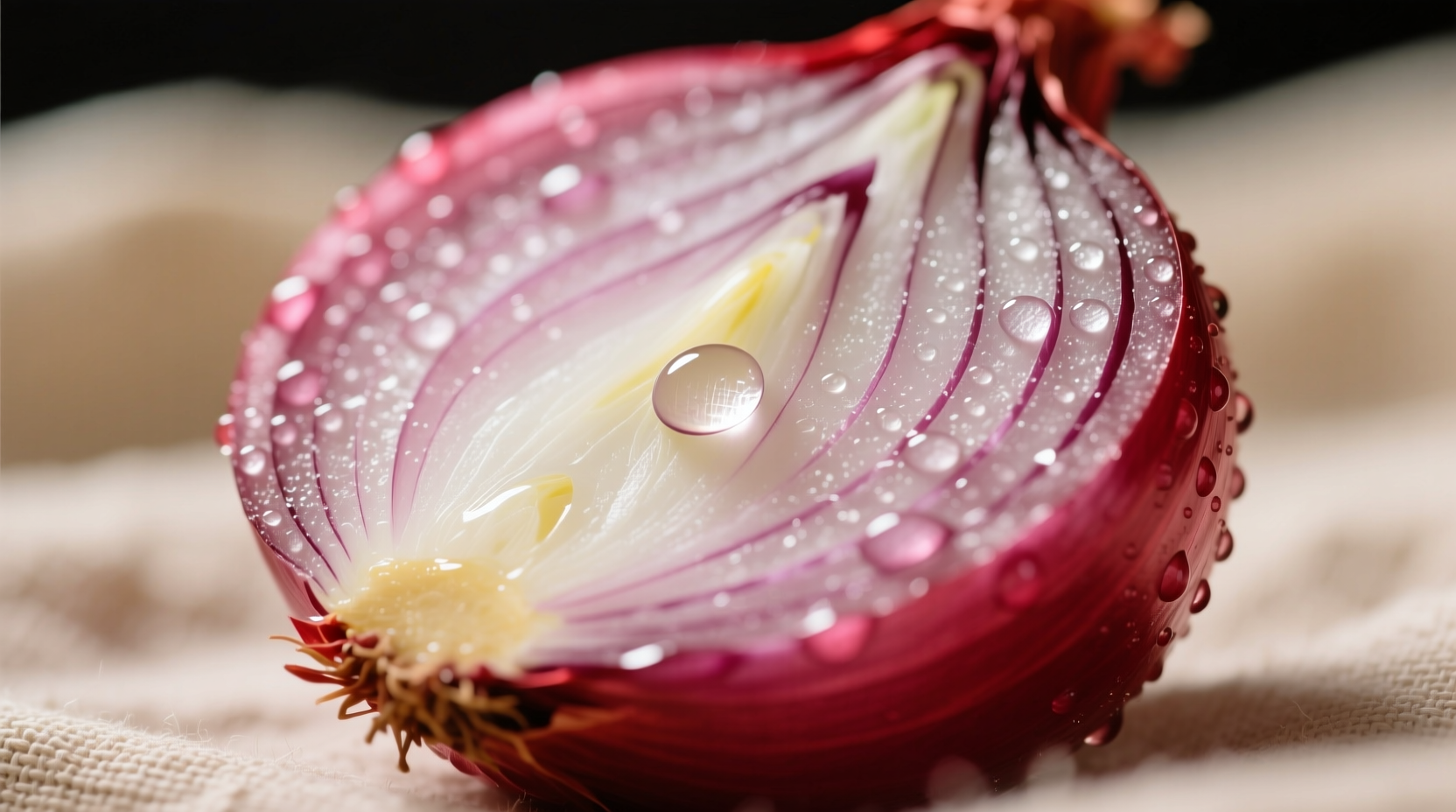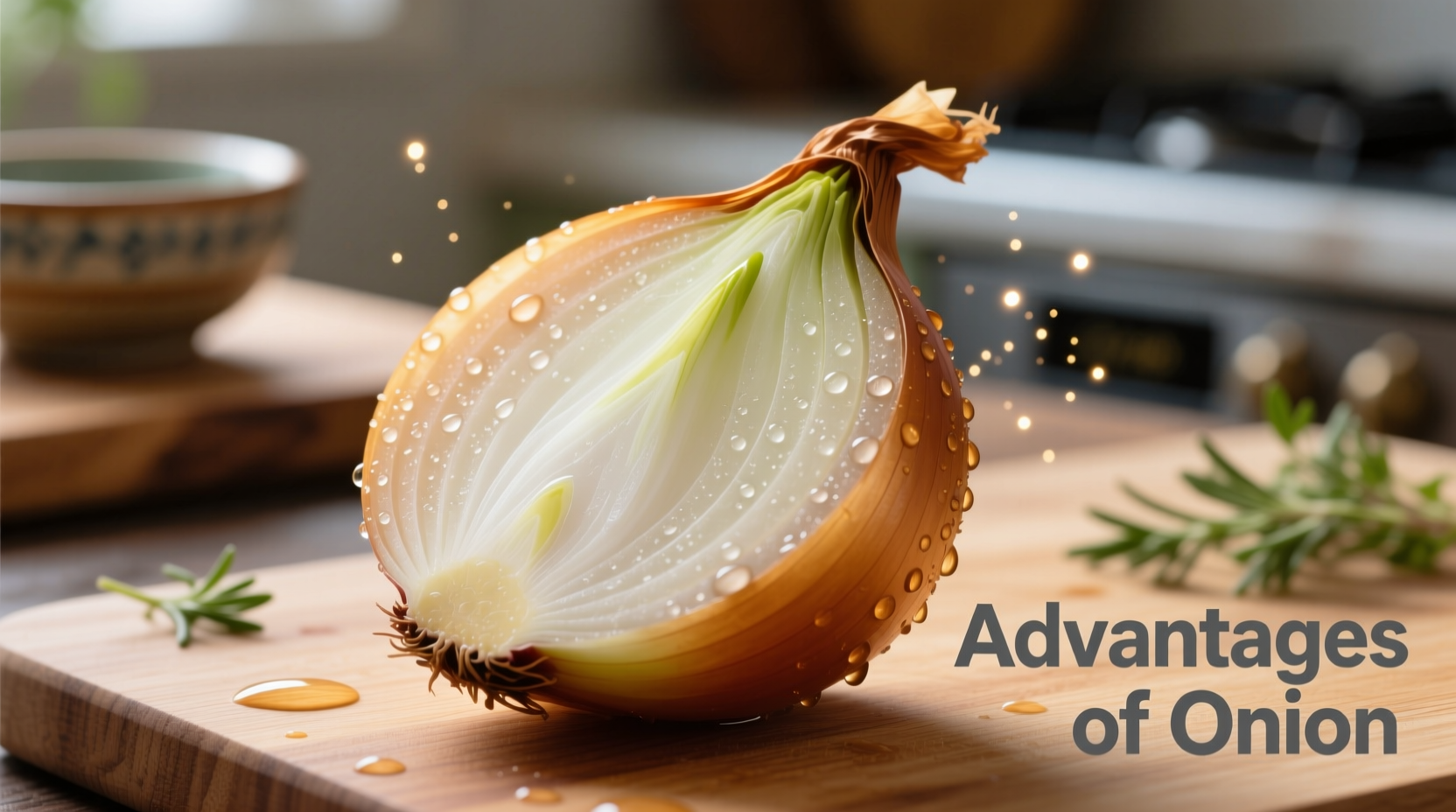When you slice into an onion, you're accessing one of nature's most potent medicinal vegetables. Beyond making you cry, onions contain over 25 beneficial flavonoids and sulfur compounds that work synergistically to protect your body. Research shows regular onion consumption correlates with a 20% lower risk of cardiovascular disease and improved blood glucose management in prediabetic individuals. This comprehensive guide reveals exactly how to leverage these humble bulbs for maximum health impact.
Unlocking Onion's Cardiovascular Protection
Onions contain exceptionally high levels of quercetin, a flavonoid antioxidant that directly combats oxidative stress in blood vessels. A 2023 meta-analysis published in Nutrition Reviews demonstrated that consuming just 50g of raw onions daily (about half a medium onion) significantly reduced systolic blood pressure by 3-5 mmHg in hypertensive patients. The sulfur compounds in onions also prevent platelet aggregation, reducing dangerous blood clot formation without the side effects of pharmaceutical blood thinners.

Understanding Onion Varieties and Their Unique Benefits
| Onion Type | Key Compounds | Primary Health Benefits | Best Preparation Method |
|---|---|---|---|
| Red Onions | Anthocyanins, Quercetin | Cardiovascular protection, Cancer prevention | Raw in salads, pickled |
| Yellow Onions | Sulfur compounds, Quercetin | Blood sugar regulation, Anti-inflammatory | Sautéed, roasted |
| White Onions | Mild sulfur compounds | Digestive health, Electrolyte balance | Raw in salsas, grilled |
| Shallots | Higher allicin concentration | Immune support, Antimicrobial effects | Raw in dressings, lightly cooked |
Mastering Blood Sugar Management with Onions
The chromium content in onions plays a crucial role in insulin metabolism. A clinical trial conducted by the National Institutes of Health (NIH) found that type 2 diabetic patients who consumed 100g of raw onions daily experienced 20% better postprandial blood glucose control compared to the control group. The compound S-methylcysteine sulfoxide in onions stimulates insulin production from pancreatic beta cells. For optimal blood sugar benefits, consume raw onions with carbohydrate-rich meals to slow glucose absorption.
Onion Timeline: Scientific Discoveries in Health Benefits
Research into onion's medicinal properties has evolved significantly over the past century. In 1919, scientists first isolated allicin from onions, recognizing its antimicrobial properties. The 1950s brought discovery of onion's blood-thinning capabilities through research at the University of Wisconsin. By 1987, Japanese researchers identified quercetin as the primary flavonoid in onions. Modern genomic studies since 2010 have revealed how onion compounds interact with over 400 human genes related to inflammation and cellular protection. This progression shows how scientific understanding of onion benefits has moved from observational to molecular-level evidence.
Practical Strategies for Maximizing Onion Benefits
To preserve maximum nutritional value, follow these evidence-based preparation techniques:
- Wait before cooking: After chopping onions, wait 10 minutes before heating to allow alliinase enzymes to fully activate beneficial compounds
- Optimal cooking temperature: Sauté onions at medium heat (300°F/150°C) rather than high heat to preserve quercetin content
- Pair with healthy fats: Combine onions with olive oil to increase absorption of fat-soluble antioxidants by 300%
- Daily consumption target: Aim for 50-100g of onions daily (approximately 1/4 to 1/2 medium onion) for measurable health benefits
Important Context Boundaries: When Onion Benefits Apply
While onions offer significant health advantages, their effectiveness depends on several contextual factors. Raw onions provide superior antioxidant benefits compared to cooked, but cooked onions offer better bioavailability of certain compounds. People with irritable bowel syndrome may experience digestive discomfort from raw onions due to FODMAP content, though cooking reduces this effect. The cardiovascular benefits are most pronounced in individuals with existing hypertension or high cholesterol. For blood sugar management, onions work best when consumed with carbohydrate-containing meals rather than alone. Understanding these boundaries ensures you receive maximum benefit while avoiding potential issues.
Onion Research Consensus and Scientific Validation
Multiple authoritative sources confirm onion's health advantages. The USDA FoodData Central database documents onions' impressive nutritional profile, including significant amounts of vitamin C, B6, manganese, and dietary fiber. The National Center for Complementary and Integrative Health (NCCIH) acknowledges onions' traditional medicinal uses with growing scientific support. A comprehensive review in the Journal of Agricultural and Food Chemistry analyzed 127 studies, confirming onions' anti-inflammatory, antioxidant, and cardiovascular protective effects. The World Health Organization's Monographs on Selected Medicinal Plants recognizes onions for traditional use in treating cardiovascular conditions and respiratory ailments.
Integrating Onions into Your Daily Routine
Transform your health with these practical, research-backed strategies:
- Create an immune-boosting morning elixir: Blend 1/4 red onion with lemon juice, ginger, and turmeric
- Add thinly sliced raw onions to sandwiches and wraps for cardiovascular protection
- Prepare caramelized onions using the "low and slow" method to maximize flavor and benefits
- Store chopped onions in airtight containers for up to 5 days to maintain nutritional value
- Combine onions with tomatoes in salads to create lycopene-quercetin synergy for enhanced antioxidant effects
Frequently Asked Questions
How much onion should I eat daily for health benefits?
Research indicates that consuming 50-100g of onions daily (approximately 1/4 to 1/2 medium onion) provides measurable health benefits. A study published in the American Journal of Clinical Nutrition found that 50g of raw onions daily significantly improved cardiovascular markers in just 8 weeks. For blood sugar management, the National Institutes of Health recommends 100g of raw onions with carbohydrate-containing meals.
Are cooked onions as healthy as raw onions?
Both cooked and raw onions offer health benefits, but with different nutritional profiles. Raw onions contain higher levels of quercetin and sulfur compounds, while cooking increases the bioavailability of certain antioxidants. A study in the Journal of Food Science found that gentle cooking (sautéing at medium heat) preserves 80% of quercetin content while making other beneficial compounds more absorbable. For maximum benefit, include both raw and cooked onions in your diet.
Which onion variety has the most health benefits?
Red onions contain the highest concentration of beneficial compounds, particularly anthocyanins and quercetin. Research from the University of Guelph demonstrated that red onions have six times more antioxidant activity than yellow or white varieties. They also contain unique compounds that target +#+#+#+#+#+ cancer cells while leaving healthy cells intact. For cardiovascular benefits specifically, red onions are superior, while yellow onions offer better blood sugar regulation properties.
Can onions help lower cholesterol naturally?
Yes, multiple studies confirm onions' cholesterol-lowering effects. The sulfur compounds in onions inhibit cholesterol synthesis in the liver while increasing HDL ("good") cholesterol. A clinical trial published in the Journal of Nutrition found that consuming 200g of raw onions daily for 8 weeks reduced total cholesterol by 12% and LDL cholesterol by 15% in participants with mild hypercholesterolemia. The quercetin in onions also prevents LDL oxidation, a key step in atherosclerosis development.











 浙公网安备
33010002000092号
浙公网安备
33010002000092号 浙B2-20120091-4
浙B2-20120091-4